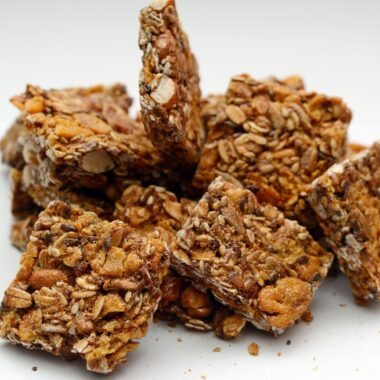Inflammation is a natural process in the body, often a response to injury or infection. However, when inflammation becomes chronic—lingering for months or even years—it can contribute to serious health issues like heart disease, diabetes, arthritis, and even cancer. The good news? Your diet can play a powerful role in managing inflammation. By incorporating anti-inflammatory foods into your daily meals, you can support your body’s ability to heal, reduce discomfort, and promote overall wellness.
In this article, we’ll explore the 10 best anti-inflammatory foods backed by science and explain why they deserve a spot on your plate every day. From vibrant berries to heart-healthy fats, these foods are not only delicious but also packed with nutrients that combat inflammation naturally. Let’s dive in!
1. Blueberries
Blueberries are tiny powerhouses when it comes to fighting inflammation. These deep-blue gems are rich in antioxidants, particularly flavonoids like anthocyanins, which give them their vibrant color. Studies have shown that these compounds can reduce inflammatory markers in the body, protecting cells from damage caused by free radicals.
Beyond their anti-inflammatory properties, blueberries support brain health, improve heart function, and may even lower the risk of chronic diseases. A 2018 study published in the Journal of Agricultural and Food Chemistry found that regular consumption of blueberries reduced oxidative stress and inflammation in participants. Add them to your morning oatmeal, blend them into a smoothie, or enjoy them as a snack—aim for a handful (about ½ cup) daily.
2. Fatty Fish (Salmon, Mackerel, Sardines)
Fatty fish like salmon, mackerel, and sardines are among the best sources of omega-3 fatty acids, specifically EPA and DHA. These healthy fats are renowned for their ability to reduce inflammation by inhibiting the production of pro-inflammatory molecules like cytokines. Research, including a 2020 review in Nutrients, highlights omega-3s’ role in lowering the risk of heart disease and easing symptoms of inflammatory conditions like rheumatoid arthritis.
To reap the benefits, aim to eat fatty fish at least twice a week, but daily inclusion of smaller portions (like sardines on toast or salmon in a salad) can amplify the effect. If you’re not a fish fan, consider a high-quality fish oil supplement, but always consult a healthcare provider first.
3. Turmeric
Turmeric, a golden spice commonly used in Indian cuisine, owes its anti-inflammatory prowess to curcumin, its active compound. Curcumin has been extensively studied for its ability to block inflammatory pathways and reduce pain and swelling. A 2016 study in Journal of Medicinal Food found that curcumin supplementation improved symptoms in patients with inflammatory conditions like osteoarthritis.
To maximize turmeric’s benefits, pair it with black pepper—piperine, a compound in pepper, boosts curcumin absorption by up to 2,000%. Add a teaspoon of turmeric to soups, rice, or a warm glass of milk (hello, golden latte!) daily. Fresh or powdered, it’s a versatile inflammation fighter.
4. Leafy Greens (Spinach, Kale, Swiss Chard)
Leafy greens are nutritional superstars, loaded with vitamins, minerals, and antioxidants that combat inflammation.
Spinach, kale, and Swiss chard are particularly rich in vitamin K, vitamin E, and polyphenols, all of which help neutralize free radicals and reduce inflammatory responses. A 2019 study in Frontiers in Immunology noted that diets high in leafy greens were associated with lower levels of systemic inflammation.
Aim for at least one cup of cooked or two cups of raw leafy greens daily. Toss them into salads, sauté them as a side dish, or blend them into smoothies. Their versatility makes them an easy addition to any meal.
5. Olive Oil (Extra Virgin)
Extra virgin olive oil (EVOO) is a cornerstone of the Mediterranean diet, widely regarded as one of the healthiest eating patterns in the world. Its anti-inflammatory benefits come from oleocanthal, a compound with effects similar to ibuprofen, a common anti-inflammatory drug. Research published in Nature in 2005 first identified this compound, sparking interest in olive oil’s therapeutic potential.
Drizzle one to two tablespoons of EVOO over salads, roasted vegetables, or whole-grain bread daily. Opt for cold-pressed extra virgin varieties to preserve its beneficial compounds, and avoid overheating it to retain maximum potency.
6. Nuts (Almonds, Walnuts)
Nuts, especially almonds and walnuts, are packed with healthy fats, fiber, and antioxidants that tackle inflammation. Walnuts are particularly high in ALA (alpha-linolenic acid), a plant-based omega-3 fatty acid, while almonds offer vitamin E, which protects cells from oxidative damage. A 2021 study in The American Journal of Clinical Nutrition linked regular nut consumption to lower levels of inflammatory markers like C-reactive protein (CRP).
A small handful (about 1 ounce or 23 almonds/14 walnut halves) daily is the perfect portion. Snack on them raw, sprinkle them over yogurt, or toss them into salads for a satisfying crunch.
7. Broccoli
Broccoli might not be everyone’s favorite, but its anti-inflammatory credentials are undeniable. This cruciferous vegetable is rich in sulforaphane, a compound that reduces inflammation by inhibiting the production of pro-inflammatory enzymes. A 2017 study in Oxidative Medicine and Cellular Longevity found that sulforaphane also supports detoxification, further protecting the body from chronic inflammation.
Aim for ½ to 1 cup of broccoli daily—steamed, roasted, or stir-fried. Pair it with healthy fats like olive oil to enhance nutrient absorption. Other cruciferous veggies like cauliflower and Brussels sprouts offer similar benefits, so mix it up!
8. Avocados
Avocados are creamy, delicious, and loaded with anti-inflammatory nutrients like monounsaturated fats, fiber, and antioxidants such as lutein and zeaxanthin. These components work together to lower inflammation and support heart health. A 2013 study in Food & Function showed that eating avocado with a meal reduced the inflammatory response triggered by digestion.
Half an avocado a day is a great target—spread it on toast, add it to salads, or blend it into a dip. Its versatility and mild flavor make it a daily staple you’ll never tire of.
9. Green Tea
Green tea isn’t just a soothing beverage; it’s a potent anti-inflammatory drink thanks to its high levels of catechins, particularly epigallocatechin gallate (EGCG). EGCG has been shown to suppress inflammatory pathways and protect against cellular damage. A 2018 study in Molecules highlighted green tea’s role in reducing inflammation in conditions like obesity and metabolic syndrome.
Sip one to two cups of green tea daily—hot or iced—to harness its benefits. Avoid overloading it with sugar, which can counteract its anti-inflammatory effects. Matcha, a powdered form of green tea, offers an even more concentrated dose of antioxidants.
10. Tomatoes
Tomatoes are a juicy addition to an anti-inflammatory diet, thanks to lycopene, a powerful antioxidant with inflammation-reducing properties. Lycopene is more bioavailable in cooked tomatoes, making sauces, soups, and roasted dishes especially effective. A 2020 study in Nutrients found that lycopene intake was linked to lower levels of inflammatory markers in the blood.
Incorporate one medium tomato (or ½ cup of cooked tomato products) daily. Slice them into sandwiches, blend them into sauces, or roast them with olive oil for a flavorful boost. Pairing them with healthy fats enhances lycopene absorption, amplifying their benefits.
Why These Foods Matter
Chronic inflammation is often fueled by poor diet, stress, and environmental factors. Highly processed foods, refined sugars, and trans fats can trigger inflammatory responses, while the foods listed above counteract these effects with their natural compounds. What makes them even better? They’re whole foods—minimally processed and packed with synergistic nutrients that work together to support your health.
Incorporating these 10 foods daily doesn’t mean overhauling your diet overnight. Start small—swap a sugary snack for blueberries, drizzle olive oil instead of butter, or sip green tea instead of soda. Over time, these habits build a foundation for long-term wellness.
Practical Tips for Daily Inclusion
- Breakfast Boost: Add blueberries and walnuts to yogurt or oatmeal.
- Lunch Upgrade: Toss spinach and avocado into a salad with olive oil dressing.
- Dinner Delight: Serve salmon with roasted broccoli and a side of turmeric-spiced quinoa.
- Snack Smart: Munch on almonds or sip green tea mid-afternoon.
- Flavor Hack: Use tomatoes and turmeric in soups or stews for a double dose of anti-inflammatory goodness.
Variety is key—rotate these foods to keep meals exciting and ensure a broad spectrum of nutrients. If you have dietary restrictions, adapt as needed (e.g., replace fish with flaxseeds for omega-3s if you’re vegan).
Conclusion
The 10 foods highlighted here—blueberries, fatty fish, turmeric, leafy greens, olive oil, nuts, broccoli, avocados, green tea, and tomatoes—are more than just trendy superfoods. They’re scientifically supported allies in the fight against inflammation, offering a delicious and sustainable way to protect your health. By eating them daily, you’re not just nourishing your body; you’re actively reducing the risk of chronic diseases and enhancing your quality of life.
So, stock your kitchen with these inflammation-fighting staples and get creative. Your body will thank you—one flavorful bite at a time.


















